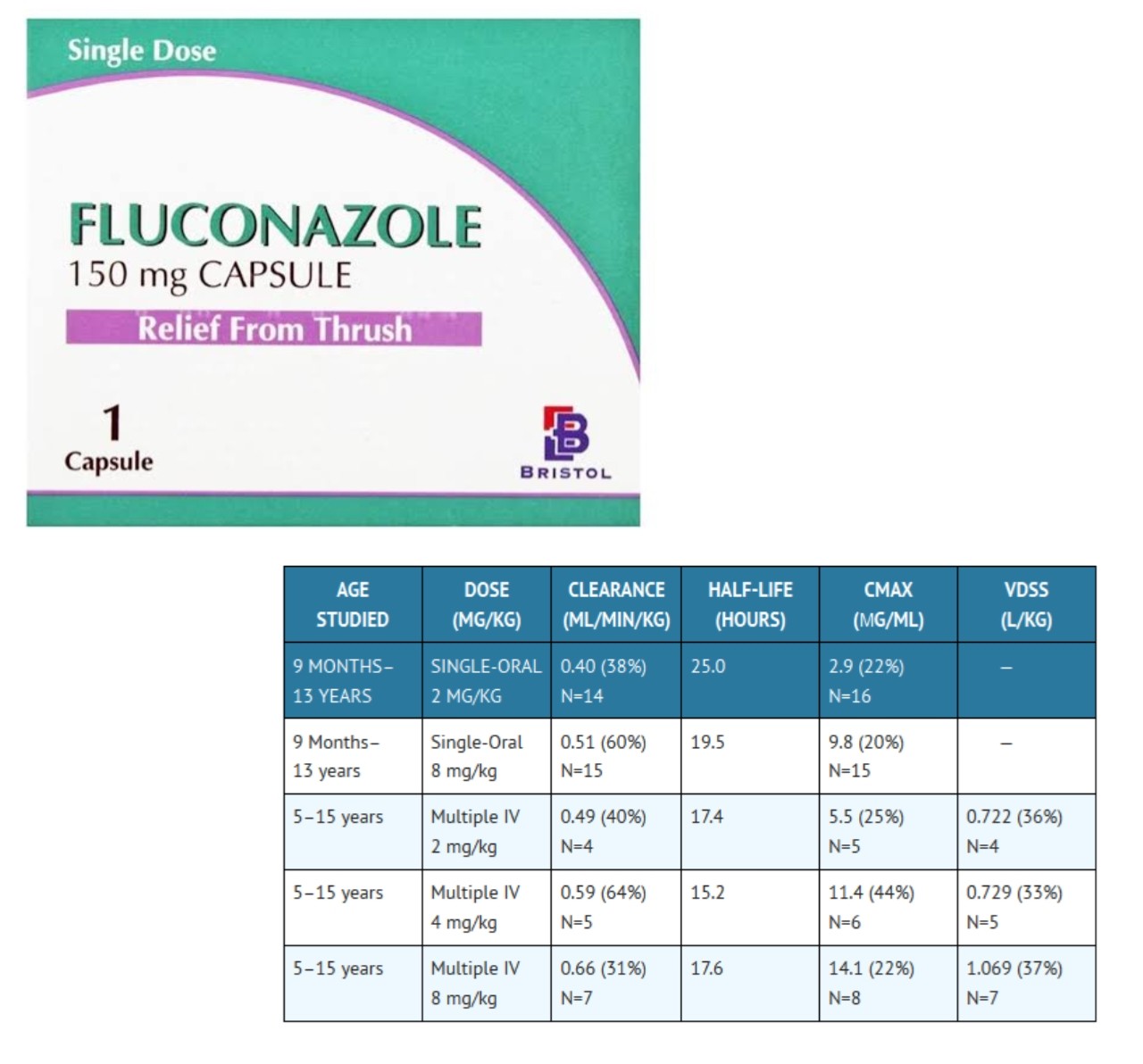What is fluconazole?
Fluconazole is a prescription drug that comes as a tablet or suspension you take by mouth. Fluconazole oral tablet is available as both a generic drug and as the brand-name drug Diflucan. Fluconazole was patented in 1981 and came into commercial use in 1988. It is on the World Health Organization’s List of Essential Medicines. Fluconazole is available as a generic medication. In 2019, it was the 133rd most commonly prescribed medication in the United States, with more than 5 million prescriptions.
Fluconazole is used to prevent and treat candidiasis. This condition is caused by infection with one of the many types of fungus Candida. Examples of candidiasis include vaginal yeast infection, as well as oral yeast infection (thrush).
Candidiasis can also cause infections in other parts of your body, including your throat, esophagus, lungs, and blood. People who have had bone marrow transplants may be treated with fluconazole to prevent candidiasis. This is because their immune systems are weakened, which makes them more likely to become infected with a severe form of candidiasis.
Fluconazole is also used to treat meningitis (infection of the brain and spinal cord) that’s caused by the fungus Cryptococcus.
How it works
Fluconazole belongs to a class of drugs called triazole antifungals. A class of drugs is a group of medications that work in a similar way. These drugs are often used to treat similar conditions.
Fluconazole works by blocking the ability of the fungi Candida and Cryptococcus to reproduce. For people with infections from these fungi, this drug helps to get rid of the infection. For people at higher risk of candidiasis, it helps to prevent infection.
How should I take fluconazole?
Follow all directions on your prescription label and read all medication guides or instruction sheets. Use the medicine exactly as directed.
Your dose will depend on the infection you are treating. Vaginal infections are often treated with only one pill. For other infections, your first dose may be a double dose. Carefully follow your doctor’s instructions.
Fluconazole oral is taken by mouth. Fluconazole injection is given as an infusion into a vein.
You may take fluconazole orally with or without food.
Shake the oral suspension (liquid) before you measure a dose. Use the dosing syringe provided, or use a medicine dose-measuring device (not a kitchen spoon).
Fluconazole injection is given as an infusion into a vein. A healthcare provider will give your first dose and may teach you how to properly use the medication by yourself. Prepare an injection only when you are ready to give it. Do not use it if the medicine looks cloudy, has changed colors, or has particles in it. Call your pharmacist for new medicine.
Use fluconazole for the full prescribed length of time, even if your symptoms quickly improve. Skipping doses can increase your risk of infection that is resistant to medication. Fluconazole will not treat a viral infection such as the flu or a common cold.
Call your doctor if your symptoms do not improve, or if they get worse.
Store fluconazole at room temperature away from moisture and heat. Do not freeze.
You may store the oral suspension in a refrigerator, but do not allow it to freeze. Throw away any leftover liquid that is more than 2 weeks old.
How Long Does Fluconazole stay in your System?
There are several factors that come into play when estimating how long Fluconazole will stay in your system because every patient has physiology unique to them. Here are some major factors you should consider when trying to understand how long Fluconazole will stay in your body:
• Age: Typically, the younger you are, the more efficient your body functions are. The more efficient your body functions, the faster Fluconazole will be removed from your system.
• Amount: The higher the dose of Fluconazole you have been taking, the longer Fluconazole will take to be removed from your system.
• Genetics: Genes predispose people to different metabolic functions, which is a key factor in how your body processes medications like Fluconazole. For this reason, your genetic makeup comes into play when estimating how long Fluconazole will remain in your system.
• Kidney and liver functions: The liver and kidneys eliminate everything you ingest, and Fluconazole is no exception. If your liver or kidneys are damaged, it will most likely take longer for your body to remove the Fluconazole from your system.
• Metabolism: Your metabolism determines how quickly you process foods, liquids, and drugs such as Fluconazole. If your metabolism is slow, it will take longer for your body to process and eliminate Fluconazole from its system than someone with a fast metabolism.
• Usage frequency: The longer you have been taking Fluconazole, the longer it will remain in your system. For example, it will take longer for someone who has taken Fluconazole for several years to remove Fluconazole from the body than someone who has only been taking Fluconazole for a few months.
According to studies, Fluconazole is cleared primarily by renal excretion, with approximately 80% of the administered dose appearing in the urine as an unchanged drug. About 11% of the dose is excreted in the urine as metabolites.
The plasma half-life of fluconazole is 30 hours. The pharmacokinetics are similar in healthy young adults and in the elderly, but dose modification is required in patients with renal impairment.
The half-life of a drug is the time taken for the plasma concentration of a drug to reduce to half its original value. Half-life is used to estimate how long it takes for a drug to be removed from your body.
According to Medssafety, fluconazole usually starts to work within one day, but it may take 3 days for your symptoms to improve, up to 7 days for your symptoms to disappear and around 7 days (150 hours) after the last use for fluconazole to leave your system. Fluconazole diffuses readily into the cerebrospinal fluid, sputum, and saliva and is concentrated in the urine and skin.
Fluconazole Side Effects
Along with its needed effects, fluconazole may cause some unwanted effects. Although not all of these side effects may occur, if they do occur they may need medical attention.
Check with your doctor immediately if any of the following side effects occur:
Rare
- Chest tightness
- chills
- clay-colored stools
- cough
- dark urine
- diarrhea
- difficulty with swallowing
- dizziness
- fast heartbeat
- fever
- headache
- hives, itching, or skin rash
- large, hive-like swelling on the face, eyelids, lips, tongue, throat, hands, legs, feet, or genitals
- light-colored stools
- loss of appetite
- nausea
- puffiness or swelling of the eyelids or around the eyes, face, lips, or tongue
- stomach pain, continuing
- unpleasant breath odor
- unusual tiredness or weakness
- upper right abdominal or stomach pain
- vomiting
- vomiting of blood
- yellow eyes and skin
Incidence not known
- Black, tarry stools
- blistering, peeling, or loosening of the skin
- chest pain or discomfort
- decreased urine
- dry mouth
- fainting
- hoarseness
- increased thirst
- irregular or slow heart rate
- joint or muscle pain
- loss of bladder control
- lower back or side pain
- mood changes
- muscle pain or cramps
- muscle spasm or jerking of the arms and legs
- numbness or tingling in the hands, feet, or lips
- painful or difficult urination
- pale skin
- red skin lesions, often with a purple center
- red, irritated eyes
- seizures
- sore throat
- sores, ulcers, or white spots in the mouth or on the lips
- sudden loss of consciousness
- swollen glands
- unusual bleeding or bruising
Get emergency help immediately if any of the following symptoms of overdose occur:
Symptoms of overdose
- Fearfulness, suspiciousness, or other mental changes
- seeing, hearing, or feeling things that are not there
Some fluconazole side effects may occur that usually do not need medical attention. These side effects may go away during treatment as your body adjusts to the medicine. Also, your health care professional may be able to tell you about ways to prevent or reduce some of these side effects. Check with your health care professional if any of the following side effects continue or are bothersome or if you have any questions about them:
Less common
- Belching
- change in taste or bad, unusual, or unpleasant (after) taste
- heartburn
- indigestion
- stomach discomfort or upset
Incidence not known
- Hair loss or thinning of the hair
Other side effects of fluconazole not listed may also occur in some patients. If you notice any other effects, check with your healthcare professional.
Call your doctor for medical advice about side effects. You may report side effects to the FDA at 1-800-FDA-1088






